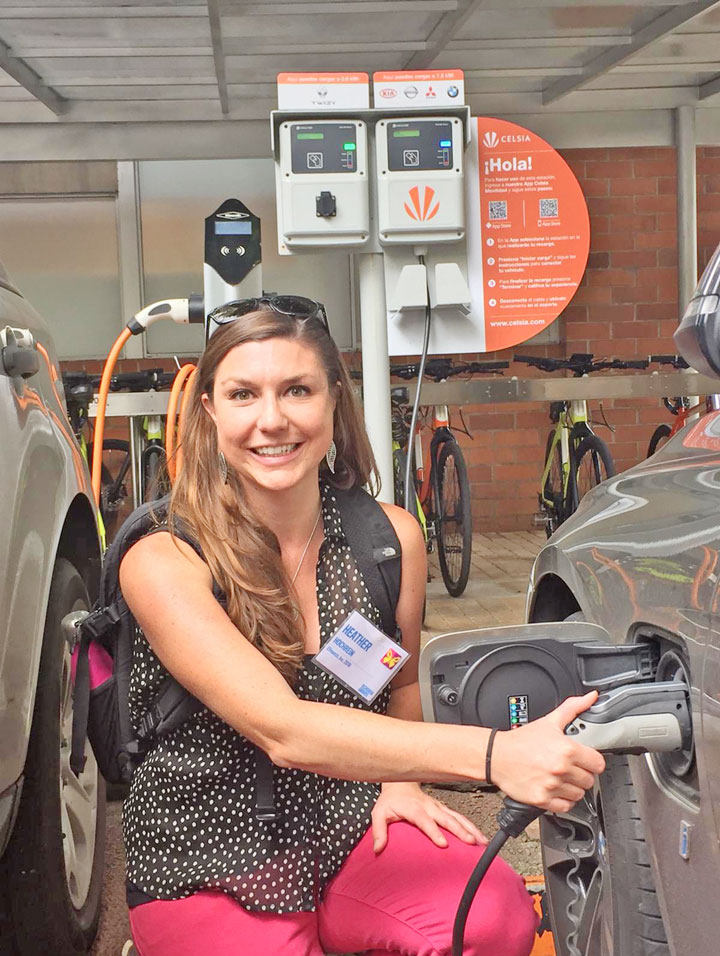Santa Barbara-grown company EVmatch was one of 10 organizations to be honored with the Global Warming Mitigation Project’s Keeling Curve Prize during an online ceremony Monday night.
 COURTESY PHOTO: EVmatch CEO and founder Heather Hochrein said her company plans on moving to Chicago to serve those without access to reliable home charging.
COURTESY PHOTO: EVmatch CEO and founder Heather Hochrein said her company plans on moving to Chicago to serve those without access to reliable home charging.
Hosted by CBS News meteorologist Jeff Berardelli and supermodel Amber Valletta, EVmatch was among the companies which received $25,000 for their extensive work addressing climate change, be it reducing carbon dioxide emissions or increasing CO2 uptake. By creating an app on which electric vehicle owners can list their privately owned charging stations with set prices and available times for public use, EVmatch is focused on the latter.
In an interview with the News-Press, the company’s CEO and founder Heather Hochrein said she and the others at EVmatch were “thrilled to be honored as innovators” by receiving the Keeling Curve Prize.
Global Warming Mitigation Project assistant director Ruth Metzel called EVmatch’s work “particularly timely,” as it increasingly allows electric vehicle owners to find and reserve charging stations wherever they go.
“A lot of EV users already suffer from range anxiety… that idea that there won’t be an EV charging station when they reach the end of their range,” she said.
By creating a network of private charging stations for public use through its app, EVmatch is addressing what Ms. Hochrein called “a major barrier” to people buying electric vehicles.
“People will not buy electric cars if they don’t have reliable charging,” she said.
According to Ms. Metzel, the Keeling Curve Prize receives more than 300 different applicants each year. Monday’s online ceremony was the third time the awards have been given out, with the annual prize debuting in 2017.
After doing a preliminary evaluation of all the applications, the Global Warming Mitigation Project makes a qualitative, and most importantly, quantitative analysis of how the applicants have worked to impact the issue of climate change.
The applicants are also asked how they plan on using the $25,000 prize should they win, but Ms. Metzel explained that the winners are ultimately allowed flexibility and autonomy in determining how to use it.
Ms. Hochrein told the News-Press that the $25,000 awarded to EVmatch will be used to expand the company’s reach into underserved communities in Chicago.
EVmatch started out as a research project Ms. Hochrein was conducting while studying for a graduate degree at UCSB’s Bren School of Environmental Science & Management. With the help of local investors and a grant from the university, she started the company out of graduate school and the company incorporated in September 2016.
Though the company still operates to some degree in Santa Barbara, much of its team is currently in Los Angeles, with staff located throughout the state. EVmatch also has teams in parts of Colorado.
The company’s interest in moving into Chicago neighborhoods is due to the city satisfying the criteria EVmatch looks at when deciding where to expand. According to Ms. Hochrein, her company looks at the electric vehicle market within a particular territory, state incentives for electric vehicles and EV charging stations, and a need for the EVmatch service.
While EV charging stations are easier for those living in single family homes to adopt, it is a challenge for renters and those who live in apartments. Because Chicago has many apartment dwellers and renters, Ms. Hochrein said it’s a place filled with the kinds of people EVmatch aims to serve.
“Our service is really focused on those who don’t have access to reliable home charging,” she said. “It’s a place we can have a huge impact with our solution.”